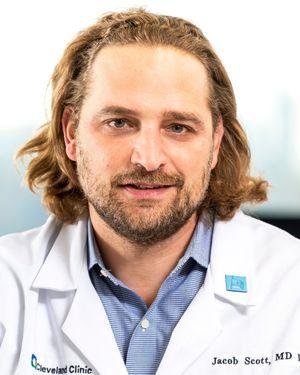Research News
12/14/2020
Combining Genomics and Mathematics Helps Personalize Radiation Therapy for Lung Cancer
Rather than a one-size-fits-all approach, new technology from Dr. Scott provide opportunity to choose personalized radiation dose to improve outcomes and reduce toxicity.

Clinical trials in lung cancer over the decades have determined an optimal “one size fits all” dosing scheme for patients treated with radiation therapy, but new research now shows this is not as biologically accurate as once believed. A new technology using tumor genomics to personalize radiation dosing demonstrates that the standard of care approach may be suboptimal for up to 75% of lung cancer patients.
A paper published in the Journal of Thoracic Oncology, co-authored by Dr. Javier F. Torres-Roca, a senior member in the Radiation Oncology Program at Moffitt Cancer Center, and Dr. Jacob G. Scott, a radiation oncologist and physician researcher in the Department of Translational Hematology and Oncology Research at Cleveland Clinic, demonstrates an approach to combine individual tumor genomics and mathematics to personalize the dose of radiation therapy for lung cancer patients. By applying this personalized technology, their study shows an opportunity to increase the efficacy and decrease the toxicity of radiation therapy.
“It’s standard of care to give patients the same radiation dose based on the type of cancer and its stage,” Torres-Roca said. “The idea that this is optimal for every patient is in direct conflict with the fact that all cancers are different. In this study, we demonstrate that the standard dose results in the majority of patients getting either too much or too little radiation. So we developed a new technology that can personalize the dose required for a specific patient’s tumor biology and quantified the clinical opportunity this provides.”
In 2017, Torres-Roca and Scott developed the Genomic Adjusted Radiation Dose (GARD), a method of dosing that accounts for biological differences and can be utilized to predict the optimal radiation therapy dose for each individual patient. The results were published in Lancet Oncology and were used as a basis for this most recent advance.
“Here we extend our work with GARD to define a new paradigm for clinical radiotherapy dose decision-making,” Scott said. “By developing a patient-specific mathematical model that factors in individual tumor biology and healthy tissue complication probabilities, we optimize clinical outcome for each individual patient.”
While the study involved non-small cell lung cancer patients, Torres-Roca and Scott are confident the technology can be used in other cancers, as well.
Moffitt Cancer Center expects to start a clinical trial utilizing the new technology in early 2021.
Adapted from the Cleveland Clinic Newsroom.
Featured Experts
News Category
Related News
Research areas
Want To Support Ground-Breaking Research at Cleveland Clinic?
Discover how you can help Cleveland Clinic save lives and continue to lead the transformation of healthcare.
Give to Cleveland Clinic